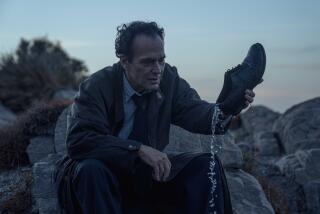Bud Clayman tells his personal story of mental illness in ‘OC87’
Bud Clayman always wanted to make movies. After graduating from Temple University in his hometown of Philadelphia with a major in radio, television and film, he came to Los Angeles in the late 1980s to seek fame and fortune. He landed work as a freelance script reader. But the depression he had suffered from since college worsened. Ultimately, he suffered a breakdown, and his movie aspirations vanished.
But almost 30 years later, the 51-year-old Clayman is seeing his dream come to life.
“OC87: The Obsessive Compulsive, Major Depression, Bipolar, Asperger’s Movie,” a film chronicling Clayman’s illness and recovery, opens in limited release in L.A. on Friday. The “87” in the title refers to the year of his first breakdown.
Clayman directed along with documentary filmmaker Glenn Holsten and Scott Johnston, a mental health professional who worked at Project Transition in suburban Philadelphia, a treatment facility where Clayman lived from 1992 to 2000.
The film, which is being held over for its third week in New York City, has earned positive reviews in the New York Times, Post, Daily News and Village Voice, and has been certified 100% fresh on rottentomatoes.com.
The camera follows Clayman over the course of two years as he attempts to conquer fears such as riding a bus, walking down the street and even speed dating. Throughout the film, viewers hear Clayman’s “inner monologues,” which he describes as “the fight inside my head.” He confesses that his obsessive-compulsive disorder causes him to have violent, angry thoughts toward people.
The documentary also features his visits with his therapist, a visit to Project Transition and Los Angeles, where he spends time with “General Hospital” star Maurice Benard, who is bipolar.
Clayman got out of Project Transition, an apartment-based therapeutic community, in 2000, and five years later he was in a writers’ workshop at a Jewish support group for the mentally ill. After he wrote an essay about how therapy had helped him, he decided to make a documentary on the subject.
Clayman initially envisioned the documentary as a series of interviews he would conduct with people who suffer from mental illness. “But that didn’t work because it didn’t have a personal story,” he said by phone from Philadelphia, where he works at the Clayman Family Foundation, established by his late father to support mental health advocacy and other social services.
He contacted Johnston and they began working on a script. “He got me on the idea of recovery and we started working on the script and thought about situations that would bring out behavior in me.”
They interviewed several directors to help them, eventually hiring Holsten. “He was the right fit for the project and brought sensitivity to the work,” said Clayman.
The shoot wasn’t entirely smooth, and there was Clayman’s emotional health to consider. Clayman doesn’t like to be told what to do, and one point in the movie he lashes out. “He had quite a different pace of life. I had to learn to take things slower and not to package as much into a shoot day as we would normally do,” said Holsten. “Buddy’s world was going from a very quiet, still place to a very active place quickly, and that had to be considered.”
Clayman was diagnosed with OCD in 2003, but it wasn’t until the film was in production that he was also found to have Asperger’s syndrome, a form of autism that affects a person’s ability to socialize and communicate effectively.
“Sometimes the diseases overlap each other,” said Clayman. “They mask something else.
“I was socially disconnected for so many years. I shut down my emotions and to cover that I developed a lot of anger toward people. I think a lot of times I felt that people were always taking advantage of me throughout my life. I developed what I call reprocessed resentment.”
Clayman says his situation has improved since he began working twice a week with an Asperger’s and social life coach and an OCD therapist. “I have to thank them. They really diagnosed what was wrong with me and really work to give me practical skills.”
Holsten and Johnston believe Clayman is in a better place these days — in part because of treatment, and in part because of the film.
“I believe he thinks his life is fuller now,” said Johnston. “He may be experiencing more of a connection” with people.
“I just ran into him on the street,” added Holsten. “I thought he is in the world in a way he wasn’t when we started doing the movie. I think it is a really because of the film and his therapists, he has been able to push himself and test himself.”
More to Read
The biggest entertainment stories
Get our big stories about Hollywood, film, television, music, arts, culture and more right in your inbox as soon as they publish.
You may occasionally receive promotional content from the Los Angeles Times.











